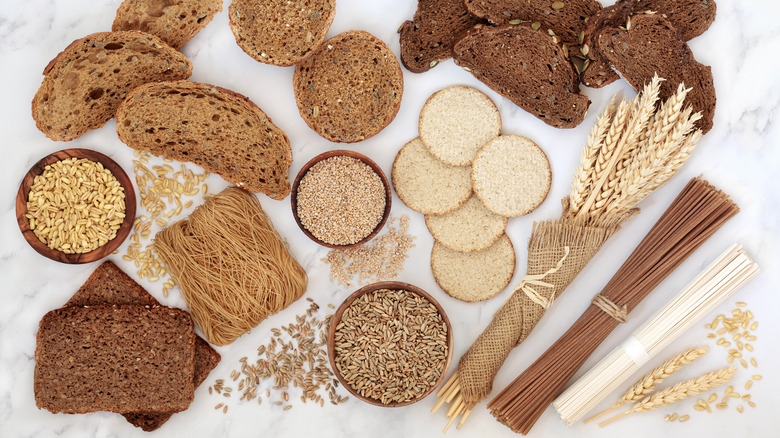The Truth About The Slow-Carb Diet
Have you ever considered going on a slow-carb diet to get leaner? This approach to fat loss was first described in "The 4-Hour Body," a bestselling book by Timothy Ferriss. He has also authored "The 4-Hour Workweek," "The 4-Hour Chef," and several other books that claim to simplify your life. The 4-Hour Body diet, or the slow-carb diet, is designed to take the stress out of meal prep and facilitate weight loss.
There is some evidence that going low-carb may help reduce fat mass and body weight, but most studies have mixed results (via Obesity Reviews). For example, a large-scale study published in the New England Journal of Medicine found that calorie restriction can lead to significant weight loss, regardless of macronutrient ratios. Simply put, you don't need to cut back on carbs or other nutrients, such as fat and carbs, to shed fat. What matters most is your calorie intake.
Ferriss claims that it's possible to lose 20 pounds in 30 days without exercise simply by following the slow-carb diet (per The 4-Hour Body). Be prepared to cut out fruits, starches, and soda and eat the same meals six days a week. Before you take the plunge, note that Ferriss is an entrepreneur, not a dietician. With that being said, here's what you should know about this diet plan.
Dieters must cut out entire food groups
The slow-carb diet has five rules. The first one says that you must cut out starchy carbohydrates, such as rice, pasta, potatoes, and whole grains (via Tim Ferriss). The second rule states that dieters should eat the same foods six days a week, especially for breakfast and lunch. Ferriss also recommends drinking plenty of water and cutting out sugary beverages. Except for avocado and tomatoes, all fruits are banned. On a positive note, it's okay to take one day off dieting each week.
While it makes sense to ditch the sugar, you may want to think twice before cutting out whole grains. These foods are rich in fiber, iron, zinc, magnesium, and other nutrients, explains Harvard T.H. Chan School of Public Health. Due to their high fiber content, they aid in digestion and slow down sugar absorption into the bloodstream.
"A lack of whole grains eliminates a lot of fiber and B vitamins from your diet, which help you feel fuller longer," dietician Kelly Strogen told The Philadelphia Inquirer. She also points out that eating bulgur and other unprocessed grains is unlikely to cause weight gain. The same goes for fruit and starchy vegetables, as they are chock-full of fiber and phytochemicals. "I've found that people who eliminate carbs are the ones who struggle the most with their weight," notes Strogen.
The slow-carb diet is relatively easy to follow
This dietary plan allows the consumption of meat, fish, eggs, and cottage cheese, as well as most types of beans. You may also eat leafy green vegetables, including spinach, kale, broccoli, and lettuce. Fermented vegetables, such as kimchi and sauerkraut, are allowed too, says Women's Health. Most of your fats should come from olive oil, butter, and nuts, but you can also add dairy-free creamer to your morning coffee. Fried foods are off-limits.
At a closer look, it's easy to notice the similarities between the slow-carb diet and the keto diet or Atkins. However, this dietary plan is slightly more flexible and doesn't require counting your daily macros. The downside is that it lacks variety, since you're supposed to eat the same meals on most days. On top of that, it says nothing about portion sizes or calories. If you eat too much of anything, the calories can add up and lead to weight gain.
Think twice before going on the slow-carb diet
Timothy Ferriss claims that his diet plan can help you lose a whopping 20 pounds in just 30 days. But as you probably know, it's not recommended or safe to lose that much weight in such a short time. "If you want to lose weight and keep it off, you want to do it in the one to two pounds per week range," said registered dietician Lauren Slayton in an interview with Women's Health.
Fad diets may help you drop pounds quickly, but you risk losing lean mass. The less muscle you have, the slower your metabolism, explains Dr. Donald Hensrud (via the Mayo Clinic). Regular exercise, especially weight training, can help preserve lean mass and boost your metabolic rate. However, Ferriss doesn't say anything about exercise. He actually claims that you don't need to work out while on the slow-carb diet.
All in all, the 4-Hour Body diet is an oversimplified approach to fat loss. It may work in the short term, but the results won't last. "As soon as you reintroduce the healthy food groups that have been removed, like whole grains and fruits, you will regain weight and likely gain back more weight than you originally lost," notes dietician Brigitte Zeitlin (via Women's Health). For lasting results, it's best to make small but sustainable changes, such as swapping your go-to snacks for whole foods.




